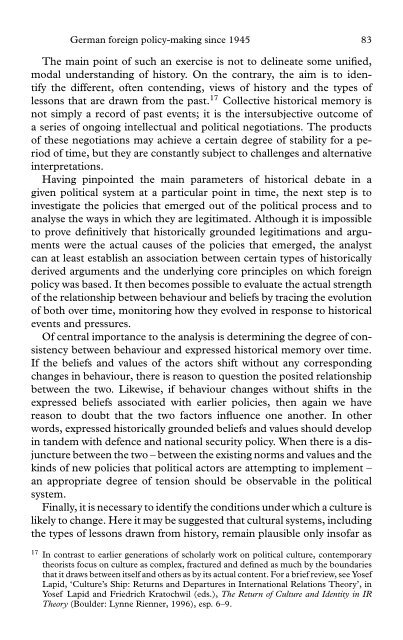Memory and Power in Post-War Europe: Studies in the Presence of ...
Memory and Power in Post-War Europe: Studies in the Presence of ...
Memory and Power in Post-War Europe: Studies in the Presence of ...
You also want an ePaper? Increase the reach of your titles
YUMPU automatically turns print PDFs into web optimized ePapers that Google loves.
German foreign policy-mak<strong>in</strong>g s<strong>in</strong>ce 1945 83<br />
The ma<strong>in</strong> po<strong>in</strong>t <strong>of</strong> such an exercise is not to del<strong>in</strong>eate some unified,<br />
modal underst<strong>and</strong><strong>in</strong>g <strong>of</strong> history. On <strong>the</strong> contrary, <strong>the</strong> aim is to identify<br />
<strong>the</strong> different, <strong>of</strong>ten contend<strong>in</strong>g, views <strong>of</strong> history <strong>and</strong> <strong>the</strong> types <strong>of</strong><br />
lessons that are drawn from <strong>the</strong> past. 17 Collective historical memory is<br />
not simply a record <strong>of</strong> past events; it is <strong>the</strong> <strong>in</strong>tersubjective outcome <strong>of</strong><br />
a series <strong>of</strong> ongo<strong>in</strong>g <strong>in</strong>tellectual <strong>and</strong> political negotiations. The products<br />
<strong>of</strong> <strong>the</strong>se negotiations may achieve a certa<strong>in</strong> degree <strong>of</strong> stability for a period<br />
<strong>of</strong> time, but <strong>the</strong>y are constantly subject to challenges <strong>and</strong> alternative<br />
<strong>in</strong>terpretations.<br />
Hav<strong>in</strong>g p<strong>in</strong>po<strong>in</strong>ted <strong>the</strong> ma<strong>in</strong> parameters <strong>of</strong> historical debate <strong>in</strong> a<br />
given political system at a particular po<strong>in</strong>t <strong>in</strong> time, <strong>the</strong> next step is to<br />
<strong>in</strong>vestigate <strong>the</strong> policies that emerged out <strong>of</strong> <strong>the</strong> political process <strong>and</strong> to<br />
analyse <strong>the</strong> ways <strong>in</strong> which <strong>the</strong>y are legitimated. Although it is impossible<br />
to prove def<strong>in</strong>itively that historically grounded legitimations <strong>and</strong> arguments<br />
were <strong>the</strong> actual causes <strong>of</strong> <strong>the</strong> policies that emerged, <strong>the</strong> analyst<br />
can at least establish an association between certa<strong>in</strong> types <strong>of</strong> historically<br />
derived arguments <strong>and</strong> <strong>the</strong> underly<strong>in</strong>g core pr<strong>in</strong>ciples on which foreign<br />
policy was based. It <strong>the</strong>n becomes possible to evaluate <strong>the</strong> actual strength<br />
<strong>of</strong> <strong>the</strong> relationship between behaviour <strong>and</strong> beliefs by trac<strong>in</strong>g <strong>the</strong> evolution<br />
<strong>of</strong> both over time, monitor<strong>in</strong>g how <strong>the</strong>y evolved <strong>in</strong> response to historical<br />
events <strong>and</strong> pressures.<br />
Of central importance to <strong>the</strong> analysis is determ<strong>in</strong><strong>in</strong>g <strong>the</strong> degree <strong>of</strong> consistency<br />
between behaviour <strong>and</strong> expressed historical memory over time.<br />
If <strong>the</strong> beliefs <strong>and</strong> values <strong>of</strong> <strong>the</strong> actors shift without any correspond<strong>in</strong>g<br />
changes <strong>in</strong> behaviour, <strong>the</strong>re is reason to question <strong>the</strong> posited relationship<br />
between <strong>the</strong> two. Likewise, if behaviour changes without shifts <strong>in</strong> <strong>the</strong><br />
expressed beliefs associated with earlier policies, <strong>the</strong>n aga<strong>in</strong> we have<br />
reason to doubt that <strong>the</strong> two factors <strong>in</strong>fluence one ano<strong>the</strong>r. In o<strong>the</strong>r<br />
words, expressed historically grounded beliefs <strong>and</strong> values should develop<br />
<strong>in</strong> t<strong>and</strong>em with defence <strong>and</strong> national security policy. When <strong>the</strong>re is a disjuncture<br />
between <strong>the</strong> two – between <strong>the</strong> exist<strong>in</strong>g norms <strong>and</strong> values <strong>and</strong> <strong>the</strong><br />
k<strong>in</strong>ds <strong>of</strong> new policies that political actors are attempt<strong>in</strong>g to implement –<br />
an appropriate degree <strong>of</strong> tension should be observable <strong>in</strong> <strong>the</strong> political<br />
system.<br />
F<strong>in</strong>ally, it is necessary to identify <strong>the</strong> conditions under which a culture is<br />
likely to change. Here it may be suggested that cultural systems, <strong>in</strong>clud<strong>in</strong>g<br />
<strong>the</strong> types <strong>of</strong> lessons drawn from history, rema<strong>in</strong> plausible only <strong>in</strong>s<strong>of</strong>ar as<br />
17 In contrast to earlier generations <strong>of</strong> scholarly work on political culture, contemporary<br />
<strong>the</strong>orists focus on culture as complex, fractured <strong>and</strong> def<strong>in</strong>ed as much by <strong>the</strong> boundaries<br />
that it draws between itself <strong>and</strong> o<strong>the</strong>rs as by its actual content. For a brief review, see Yosef<br />
Lapid, ‘Culture’s Ship: Returns <strong>and</strong> Departures <strong>in</strong> International Relations Theory’, <strong>in</strong><br />
Yosef Lapid <strong>and</strong> Friedrich Kratochwil (eds.), The Return <strong>of</strong> Culture <strong>and</strong> Identity <strong>in</strong> IR<br />
Theory (Boulder: Lynne Rienner, 1996), esp. 6–9.
















